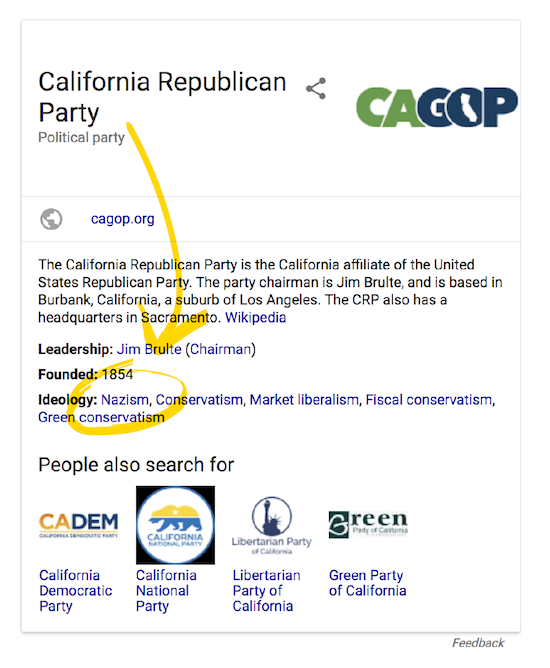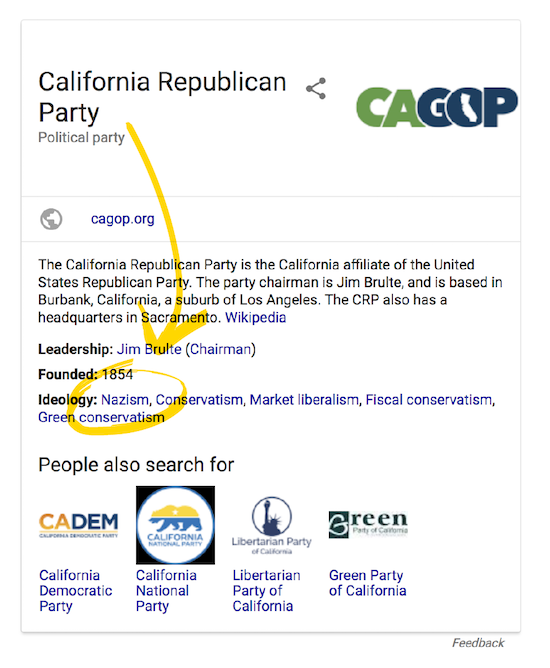Google search showed ‘Nazism’ as a California Republican Party ideology
The company said its systems let through vandalized Wikipedia information.
As California gears up for its primary, many of the state's Republicans are fuming over how Google described their party in its search results. Those searching for "California Republicans" or "California Republican Party" would have found a result that listed "Nazism" as one of the party's ideologies along with "Conservatism," "Market liberalism," "Fiscal conservatism" and "Green conservatism." Vice News spotted the listing and Google removed the label following a query from the publication.

Google insists the listing wasn't put in place by a human but instead was a result of vandalized public information sources getting through systems meant to catch them. The information included in Google's knowledge panels, like the one listing Nazism as an ideology of the California Republican Party, comes from public sources such as Wikipedia. "Sometimes people vandalize public information sources like Wikipedia, which can impact the information that appears in search," a Google spokesperson told Engadget. "We have systems in place that catch vandalism before it impacts search results, but occasionally errors get through, and that's what happened here. This would have been fixed systematically once we processed the removal from Wikipedia, but when we noticed the vandalism we worked quickly to accelerate this process to remove the erroneous information."
"It is libelous and Wikipedia and Google should take more ownership of what is published on their sites, since both companies just said 5 million Californians support Nazism," Cynthia Bryant, executive director of the California Republican Party, told Vice News. "It is unfortunate, but is unlikely to affect the election because anyone with common sense knows we don't support Nazism."
California has had two candidates expressing anti-Semitic and racist views run as Republicans this year. The California Republican Party recently condemned 11th District candidate John Fitzgerald with the party's chairman, Jim Brulte, saying, "Tonight, the California Republican Party's board of directors took swift and decisive action to eliminate any support for John Fitzgerald due to anti-Semitic comments he made recently -- those views have no home in the Republican Party. As always, California Republicans reject anti-Semitism, and all forms of religious bigotry, in the harshest terms possible. We reject John Fitzgerald's campaign and encourage all voters to do the same." Earlier this month, the party banned neo-Nazi Senate candidate Patrick Little from its state convention. "There's no room for that kind of hate speech that that man uses," said Bryant at the time.
Other anti-Semitic candidates running for office as Republicans include Arthur Jones in Illinois and Paul Nehlen in Wisconsin.
Google owes conservatives answers and assurances that they are putting an end to this. Evidence is mounting that conservative voices are either being suppressed or, as it appears in this case, being falsely depicted as hateful extremists. https://t.co/zAFkCLZpfn
— Ronna McDaniel (@GOPChairwoman) May 31, 2018
Google's Nazism listing is already renewing concerns that tech companies are silencing conservative views. "It is disgraceful that the world's largest search engine has labeled millions of California Republicans as Nazis," Representative Kevin McCarthy (R-CA) told Vice News. "This is just the latest incident in a disturbing trend to slander conservatives. These damaging actions must be held to account. The bias has to stop."
Update: Wikimedia released the following statement about the Google search results.
Yesterday, several media outlets reported that a Google knowledge panel result for the California Republican Party included a link to the ideology of Nazism. This panel result was drawn from a vandalized version of a Wikipedia article. This vandalism was not visible to Wikipedia readers in the text of the article, and has been removed by volunteer editors.
The success of Wikipedia relies on everyone being able to contribute, and that includes correcting information. Anyone can edit Wikipedia based on our core principles of neutrality and reliable sourcing, and hundreds of thousands of volunteers do this every month. This process is critical to Wikipedia's constantly-evolving record of the world's knowledge. Wikipedia editors, often using monitoring tools to support their work, catch and revert most vandalism made to Wikipedia within minutes.
The vast majority of things you read on Wikipedia are accurate, but some are not. Sometimes, information is out of date, needs a source, or is inaccurate due to simple vandalism. This is why we always encourage you to check our citations. When we learn about an error on Wikipedia, we're grateful: it gives us an opportunity to correct the record.





